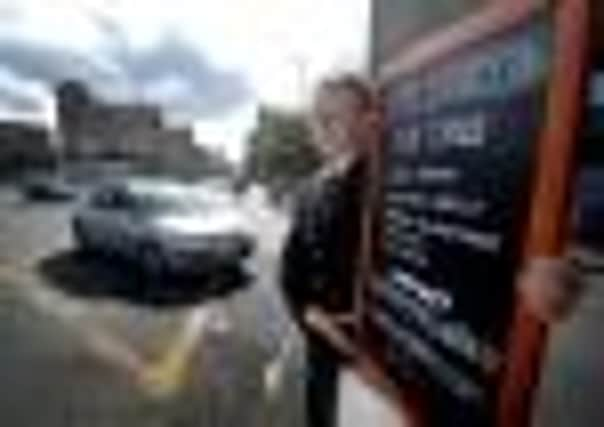Echoes of the 1930s as this job hunter hits the streets


The man feels faint and is perspiring, despite a cool breeze, and has to be given cold water to revive him.
But it’s not the 1930s. It’s Britain in July, 2012.
The man isn’t dressed in the clogs and flat cap of the 1930s. He’s wearing a suit, collar and tie.
Advertisement
Hide AdAdvertisement
Hide AdHis name is Michael Hall. He’s 26, and he’s one of more than 2.6 million people looking for work in austerity Britain.
He was standing at the busy roundabout where Leeds inner-ring road meets Wellington Street and the A65 Kirkstall Road.
Mr Hall is from Beeston in south Leeds. He passed five GCSE’s at Woodkirk High School.
He started sixth form study but then decided to take on voluntary work at White Rose Study Support centre, based at the shopping centre outside Morley.
Advertisement
Hide AdAdvertisement
Hide AdThe project involved helping youngsters who were struggling academically at school, by giving them “accelerated” lessons.
He enjoyed it.
He was good at it too, so much so that the project gave him a full-time, though temporary, job as a “mentor co-ordinator” - teaching others how to teach. He was 18 at the time.
“My contract expired,” he said, “And they decided not to keep me on.”
He didn’t stand still. He found work in supermarkets, including ASDA and the B&Q DIY chain, working as a sales assistant.
Advertisement
Hide AdAdvertisement
Hide AdAfter that he turned to the internet, trying to develop a website company.
He tried his hand at the licensed trade, taking a pub at Morley, the Scotsman Inn.
“Unfortunately that went downhill and I’ve been looking for work since then,” he said.
That was 12 months ago. Mr Hill had left his family’s home in Beeston after starting work. He’d started a relationship and 13 months ago a child was born. But it wasn’t working and the couple parted amicably.
Advertisement
Hide AdAdvertisement
Hide AdHe’s now had to move back in with his parents - dad is a self-employed appliance engineer, washing machines and the like.
His mother, a care assistant, is on long-term sickness absence suffering cancer, though the treatment is showing promising signs. His 24-years-old sister is a mid-wife.
He can’t afford to live alone because it’s not possible for him to maintain a home on the money he receives.
“I get £120 every two weeks, Jobseekers’ Allowance,” he said.
Advertisement
Hide AdAdvertisement
Hide AdTo receive even that amount he has to prove he is looking for work.
“It’s soul-destroying, trying to find work. I’m looking for pretty much anything.”
The chalk board he is holding lists some areas of experience. It’s neatly drawn.
“Sales support,” it says. “Customer service. Trainee recruitment consultant. Call centre.”
Advertisement
Hide AdAdvertisement
Hide AdIt gives his contact details as mobile telephone number 0740 762 6867, e-mail address [email protected]
“Anything I see I apply for,” he said.
Often he doesn’t even get a reply to his inquiry. Other times it’s an interview ending with a “Sorry, but no.”
He said he makes a point of applying for five jobs a day.
“Any job I find, I apply for,” he said.
The motorists who drive past him at the busy junction appear sympathetic. Horns are parped, thumbs-up signs are given.
He’s trying to usefully use the hour he’s got before he goes to the benefits office half a mile away in the city centre to sign on.
Advertisement
Hide AdAdvertisement
Hide AdIt’s not the first time since the 1930s that such desperate scenes have occurred. In the early 1980s, when mass unemployment was again created, desperate jobless people walked the streets carrying placards saying “I want to work.”